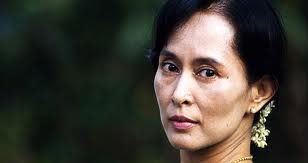 Myanmar’s opposition leader reiterates resolve to run for president in 2015
Myanmar’s opposition leader reiterates resolve to run for president in 2015- Union Minister Soe Thane described Myanmar’s journey to democracy as “irreversible”
- The government and Aung San Suu Kyi were urged to ensure inclusiveness and protection of minority rights
Nay Pyi Taw, Myanmar, 6 June 2013 – “I want to run for president and I’m quite frank about it,” said Aung San Suu Kyi, Chairman of the National League for Democracy (NLD); Member of Parliament from Kawhmu Constituency, Myanmar. “But for me to be eligible for the post of the presidency, the constitution will have to be amended.”
The opposition leader was speaking in a televised session at the World Economic Forum on East Asia today in Nay Pyi Taw. Soe Thane, Union Minister, Office of the President of Myanmar, was also on the panel. He is often described as the minister whose thinking is closest to that of Myanmar’s President Thein Sein.
Soe Thane said that amending the constitution is always possible, although Aung San Suu Kyi described the document passed in 2008 as “the most difficult constitution in the world to amend.” Soe Thane stressed that the political and economic changes in Myanmar are “irreversible”, but asked for more patience from the people of Myanmar and the international community. The process started only in 2010. “We need time to loosen, to untie the rope [that had bound the country] for 60 years,” he said.
Asked about protection for Myanmar’s minorities, including the Rohingya Muslims who have recently suffered attacks by elements from the majority community, Soe Thane said the issue is complex and should be discussed by a commission. But he said the government is committed to protecting the security of all citizens.
Responding to criticism that she has not done enough for the Rohingyas, Aung San Suu Kyi said, “At the moment, nobody is very satisfied with me because I do not take sides … I have not been silent. It’s just that [the critics] are not hearing what they want to hear from me.”
She reiterated her position that the rule of law must prevail, and that means investigating whether the people accorded citizenship under the 1982 citizenship law have indeed been granted citizenship. She also called for a re-examination of the law to ensure it complies with international norms.
The wide-ranging debate touched on many aspects of what is happening in Myanmar politically, socially and economically, including the issue of political prisoners, holding accountable those who misruled the country and committed illegal acts, and ensuring that the fruits of reform are shared with everyone, particularly the 70% of the population who live in the countryside.
Despite the problems, the overwhelming majority of the 400 or so participants in the session indicated they are optimistic about where the country is headed.
Over 1,000 participants from 55 countries are taking part in the World Economic Forum on East Asia, held for the first time in Nay Pyi Taw, Myanmar. The meeting welcomes over 100 public figures representing 15 countries, including heads of state or government from Laos, Myanmar, the Philippines and Vietnam. More than 550 business leaders, over 60 Global Growth Companies and nearly 300 young leaders from the Forum’s Young Global Leaders and Global Shapers communities, together with other members of civil society, academia and media are convening to discuss the challenges and opportunities facing Myanmar and East Asia today.
The Co-Chairs of the World Economic Forum on East Asia are: Helen E. Clark, Administrator, United Nations Development Programme (UNDP), New York; Anthony F. Fernandes, Group Chief Executive Officer, AirAsia, Malaysia; Yorihiko Kojima, Chairman of the Board, Mitsubishi Corporation, Japan; Indra Nooyi, Chairman and Chief Executive Officer, PepsiCo, USA;Subramanian Ramadorai, Vice-Chairman, Tata Consultancy Services, India; and John Rice,Vice-Chairman, GE, Hong Kong SAR.
Sky Net is the host broadcaster of the 2013 World Economic Forum on East Asia.
